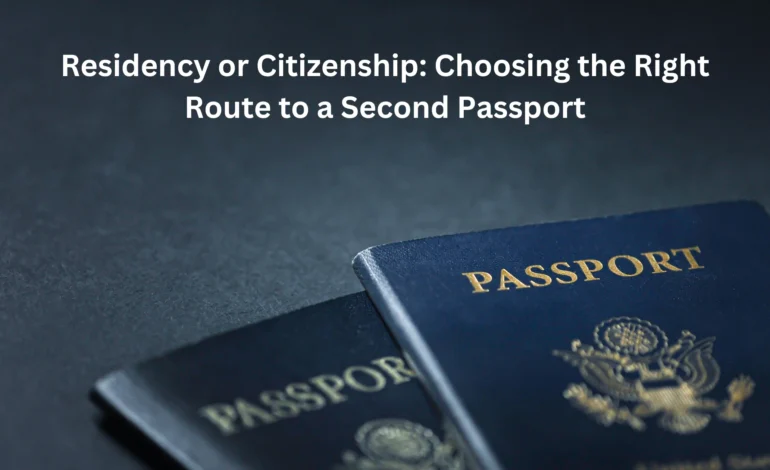
Residency or Citizenship: Choosing the Right Route to a Second Passport
As global mobility becomes a priority for many, the pursuit of a second nationality or residence option has grown significantly. People explore these paths for better opportunities, tax advantages, family security, or simply the freedom to travel with fewer restrictions.
However, deciding between establishing residency or acquiring citizenship is not straightforward; each path offers unique benefits and considerations. Before exploring how to get a second passport, it’s essential to understand the differences between residency and citizenship for anyone aiming to expand their personal or financial horizons through a second-country status.
Table of Contents
Differences in Rights and Privileges
Both residency and citizenship provide benefits, but the scope varies. Citizens enjoy more comprehensive rights, such as participating in political decisions, voting, and easier access to certain social services. Residents, though they can often enjoy similar living and working rights, may face limitations in areas like legal standing or social support. Citizenship can also offer more secure protection and the opportunity to pass it to descendants automatically, while residency might have limited transferability to family members.
Travel Flexibility and Global Mobility
Mobility is a significant consideration for those looking into a second residence or nationality. With citizenship, individuals can often benefit from stronger travel privileges, especially if the country has favorable visa agreements with other nations. This ease of movement can be especially advantageous for those in professions or businesses that require frequent international travel. Residency, however, may not provide the same level of passport power; while it allows entry and exit into that specific country, travel to other regions might still require visas.
Long-Term Or Short-Term Commitment Requirements
The commitment involved in securing residency compared to citizenship varies widely. Residency is often seen as a shorter-term commitment, with the flexibility to stay as long as conditions are met but without the need to fully integrate into the country’s culture or policies. Citizenship, however, usually implies a long-term or even permanent commitment, including potential tax obligations, especially for those from countries with citizen-based taxation.
Investment Requirements
Investment is often a central component in obtaining a second residence or citizenship. Many countries offer residency by investment, where individuals invest in real estate, business, or government funds to qualify. Such options allow individuals to live within the country but may still have renewals based on the duration of the investment. Citizenship by investment, however, tends to require a larger financial commitment and often involves more rigorous background checks.
Legal and Tax Implications
Legal and tax considerations are critical in choosing the right path. Citizenship may introduce tax obligations depending on both the new and original country’s policies. Some nations tax worldwide income, meaning that becoming a citizen could result in new tax liabilities. Residency, on the other hand, might offer more flexibility in taxation, particularly for those who do not spend substantial time in the country. Additionally, residency often allows individuals to benefit from tax treaties or exemptions without fully committing to the financial responsibilities of citizenship.
Impact on Family and Dependents
For families, the choice between residency and citizenship has broader implications. Citizenship can automatically extend to direct descendants, ensuring future generations benefit from the same rights. Residency, though often extendable to dependents, may involve more complicated processes and not necessarily confer permanent rights to children.
Lifestyle and Integration Expectations
Lifestyle and cultural integration are also relevant to this choice. Those seeking a fresh cultural experience and a deeper connection with a new society may lean towards citizenship, which encourages a more profound integration. Residency often allows individuals to enjoy a new environment without fully immersing themselves in the local culture or language.
Timeline for Residency to Citizenship Pathways
Many nations offer pathways where residency can eventually lead to full citizenship after fulfilling certain requirements, such as time lived in the country, language proficiency, and knowledge of local customs. For individuals who prefer starting with residency to “test” a country before making a long-term commitment, this can be a good option.
Selecting a Consultancy Service for Guidance and Support
Navigating the complexities of residency and citizenship can be daunting, especially given the legal, tax, and procedural intricacies. A reliable consultancy service can provide invaluable guidance, helping applicants select the best route for their unique circumstances. These services can simplify application processes, clarify tax implications, and offer insights into regional policies, ultimately making the journey smoother and more efficient.Knowing how to get a second passport is important for choosing between residency and citizenship as a means of acquiring a second legal status. The process depends on various factors, including personal goals, financial capacity, and long-term aspirations. While residency offers flexibility and ease of establishment, citizenship provides permanence and a deeper level of integration and rights.




